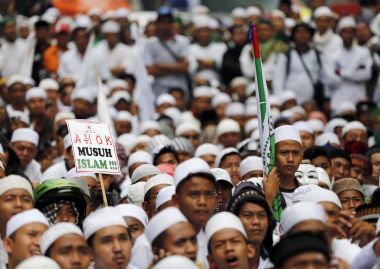Muslims protest Christian governor in Jakarta: 'It is forbidden to have an infidel'

The inauguration of Jakarta's first Christian governor in 50 years has been delayed to allow for a presidential decree on his appointment, another setback on his contested journey to power.
Deputy Governor Basuki Tjahaja Purnama had been scheduled to be sworn in today. He succeeds Joko Widodo, who last month became President of Indonesia.
However, it is not the first obstacle Chinese Christian Purnama, who is known by the nickname Ahok, has faced. His rise to power has been contested by religious hardliners who have held multiple protests in Jakarta.
In September, around 200 members of the Islamic Defenders Front (FPI) staged a demonstration in front of a regional legislative building in the capital city. One of the group's leaders told news agencies that it is "forbidden to have an infidel as the head of Jakarta".
"Ahok Basuki Tjahaya Purnama, we reject him to be the governor of Jakarta because he has no moral ethics," the spokesperson said.
Another protest was held on October 3, which became violent and resulted in the injury of 16 police officers.
A further demonstration on November 10 saw FPI members and those from other Muslim groups, this time numbering over 2,000, march to Jakarta city hall, again to call on the government to stop Ahok's appointment. The rally was thought to be organised by Islamic scholar and activist Muhammed Rizieq Shihab, who founded the FPI. The group has declared that it remains "a faithful support of the Islamic Jihad Movement all around the world".
However Ahok has suggested that the protests could be politically swayed, rather than as a result of his religion or ethnicity.
The Indonesian constitution guarantees freedom of religious belief, and the country is predominantly moderate, however Christian Solidarity Worldwide (CSW) reports that militant Islamists have been able to push through a number of measures in recent years which could have "serious, long-term implications" on minority rights.
A report released in February of this year found that rising religious intolerance across the country "poses a threat...to all Indonesians who value democracy, human rights, peace and stability."
Political parties have "pandered to the Islamist narrative, perceiving a need to appeal to religiously conservative constituencies at a local level," CSW said, and "a variety of radical Islamist organisations have emerged and gained a disproportionate influence over policymaking and implementation."
"Indonesia's pluralism is in peril, and almost all of Indonesia's different religious communities are affected... Religious intolerance, once thought to be confined to specific regions, now appears to be spreading nationwide," the organisation warned.
(Additional reporting by Reuters)











